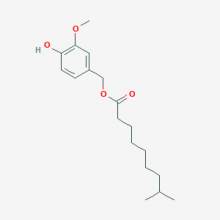Why people would concern Dihydrocapsiate?
Why people would concern Dihydrocapsiate? Dihydrocapsiate (DCT In vivo and in vitro electrophysiological experiments have shown that dihydrogen compounds have nearly similar potency compared to other capsaicinoids.) is a natural safe food ingredient which is structurally related to capsaicin from chili pepper and is found in the non-pungent pepper strain, CH-19 Sweet. It has been shown to elicit the thermogenic effects of capsaicin but without its gastrointestinal side effects.

A 2010 study demonstrated the potential of dihydrocapsiate to increase metabolic rates. Their data provided convincing evidence that, at least for several hours after the test meal was consumed, energy expenditure was significantly increased in the group consuming the highest amount of DCT. Dihydrocapsiate is a capsinoid found in chili peppers. It’s similar to capsaicin. People who took a dihydrocapsiate supplement for one month raised their metabolic rates by about 50 calories.

Dihydrocapsiate is a new weight loss therapy
Consumption of capsaicin or its nonpungent analogues, capsinoids has been reported to affect energy expenditure and fat oxidation, although available data are still controversial. The aim of the present study was to conduct a meta-analysis regarding the effects of these substances on energy expenditure and respiratory quotient, with special emphasis on the role of body mass index (BMI) of the participants. Medical databases were systematically searched for papers. Of the 627 trials identified, 9 provided results suitable to be included in analysis. Data analysis showed that after ingestion of capsaicin or capsinoids the energy expenditure increased (245 kJ/day, 58.56 kcal/day, p = 0.030) and the respiratory quotient decreased (by 0.216; p = 0.031) indicating a rise in fat oxidation. Studies with mean BMI of the participants below 25 kg/m2 failed to report any effect of capsaicin or capsinoids on the energy expenditure (p = 0.718) or on the respiratory quotient (p = 0.444), but studies with mean BMI exceeding 25 kg/m2 demonstrated an increase in energy expenditure (292 kJ/day, 69.79 kcal/day, p = 0.023) and a marked decrease in respiratory quotient (-0.257, p = 0.036). Our data clearly suggest that capsaicin or capsiate could be a new therapeutic approach in obesity promoting a negative energy balance and increased fat oxidation.
Dihydrocapsiate helps to delay aging
Metabolic dysfunction is associated with aging and results in age-associated chronic diseases, including type 2 diabetes mellitus, cardiovascular disease, and stroke. Hence, there has been a focus on increasing energy expenditure in aged populations to protect them from age-associated diseases. Dihydrocapsiate (DCT) is a compound that belongs to the capsinoid family. Capsinoids are capsaicin analogs that are found in nonpungent peppers and increase whole body energy expenditure. However, their effect on energy expenditure has been reported only in young populations, and to date the effectiveness of DCT in increasing energy expenditure in aged populations has not been investigated. In this study, we investigated whether DCT supplementation in aged mice improves age-associated impairments. We obtained 5-wk-old and 1-yr-old male C57BL/6J mice and randomly assigned the aged mice to two groups, resulting in a total of three groups: 1) young mice, 2) old mice, and 3) old mice supplemented with 0.3% DCT. After 12 wk of supplementation, blood and tissue samples were collected and analyzed. DCT significantly suppressed age-associated fat accumulation, adipocyte hypertrophy, and liver steatosis. In addition, the DCT treatment dramatically suppressed age-associated increases in hepatic inflammation, immune cell infiltration, and oxidative stress. DCT exerted these suppression effects by increasing energy expenditure linked to upregulation of both the oxidative phosphorylation gene program and fatty acid oxidation in skeletal muscle. These results indicate that DCT efficiently improves age-associated impairments, including liver steatosis and inflammation, in part by increasing energy expenditure via activation of the fat oxidation pathway in skeletal muscle.
Recent advances in the study on capsaicinoids and capsinoids.
Chili peppers are the major source of nature capsaicinoids, which consist of capsaicin, dihydrocapsaicin, nordihydrocapsaicin, homodihydrocapsaicin, and homocapsaicin, etc. Capsaicinoids are found to exert multiple pharmacological and physiological effects including the activities of analgesia, anticancer, anti-inflammation, antioxidant and anti-obesity. Therefore, capsaicinoids may have the potential value in a clinic for pain relief, cancer prevention, and weight loss. In addition, capsaicinoids also display the benefits on cardiovascular and gastrointestinal system. It has been shown that capsaicinoids are potential agonists of capsaicin receptor or transient receptor potential vanilloid subfamily member 1 (TRPV1). They could exert the effects not only through the receptor-dependent pathway but also through the receptor-independent one. CH-19 Sweet peppers are the source of nature capsinoids, which share a similar structure with capsaicinoids and consist of capsiate, dihydrocapsiate, and nordihydrocapsiate, etc, Comparing with capsaicinoids, capsinoids are less pungent and easily broken down in the normal aqueous conditions. So far, it has been found that capsinoids possess the biological properties of antitumor, antioxidant and anti-obesity. Since capsinoids are less toxic than capsaicinoids, therefore, Capsinoids may have advantages over capsaicinoids in clinical applications such as cancer prevention and weight loss.
Dihydrocapsiate contains many possibilities and is therefore of concern
Dihydrocapsiate may have more useful functions than we think. I believe that in the experiment, scientists may give us an answer. However, before this, people in a hurry have begun to extract a large amount of Dihydrocapsiate into powder or liquid for sale, making them into food additives and nutritional supplements.
If you need to buy Dihydrocapsiate ingredients to produce related products or you are looking for suppliers, please contact us
Send inquiry online For more product information and prices
(Pharmaceutical Ingredients Manufacturer & Supplier & Exporter.)
After sending the online inquiry, we will reply you as soon as possible, if not get any response on time please contact us by Tel or Email. —— Green Stone Swiss
Email: sales@raw-pharmaceutical-materials.comTel: +86 592 5365887
WhatsApp: +86 189 6515 7632
Send inquiry online:

